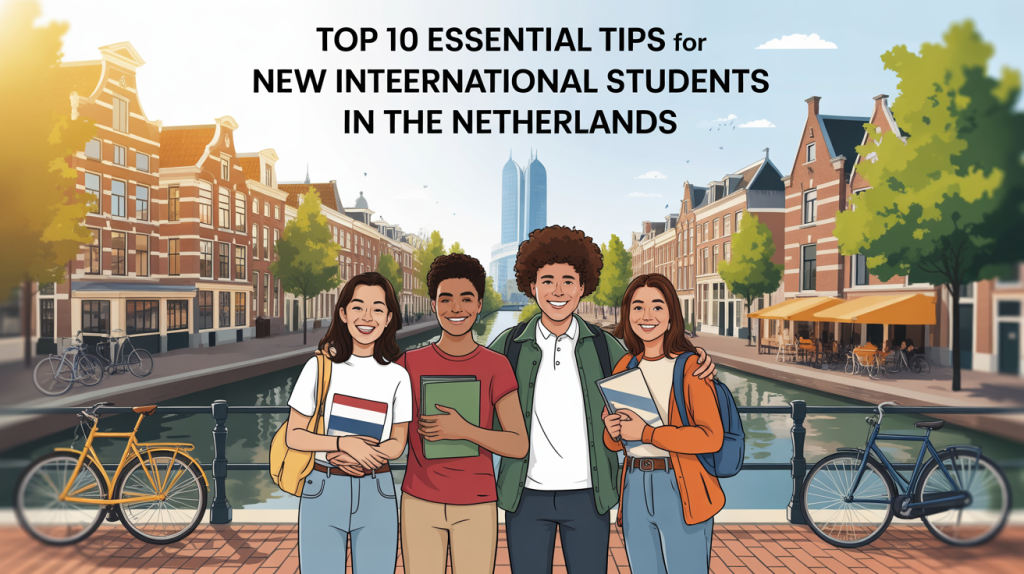Top 10 Essential Tips for New International Students in the Netherlands
Be Open-Minded |
Learn to Cook |
Budget Wisely |
Explore Beyond Your Campus |
Secure Accommodation Early |
Learn Basic Dutch |
Stay Organized with Administration |
Get Involved in Student Life |
Prioritize Self-care and Wellbeing
Master Cycling: Navigating Dutch Life on Two Wheels
Cycling is the cornerstone of daily transport in the Netherlands—efficient, eco-friendly, and affordable. For many students, bicycles serve as the primary way to get to campus, supermarkets, and social events.
- Why it matters: Mastering cycling allows students to move freely, avoid costly public transport, and experience the Dutch lifestyle firsthand.
- Key advice: Practice before arrival if possible, understand Dutch traffic rules, and invest in a reliable bike and lock.
- Benefits: Increased independence, fitness, and the ability to explore the rich Dutch countryside.
Be Open-Minded: Embrace Dutch Culture and Diversity
Cultural openness significantly enriches the international student experience. The Netherlands boasts a multicultural society with diverse customs, social norms, and cuisines.
- Engage actively: Join campus clubs, attend local cultural events, and be willing to try new foods and traditions.
- Build connections: Foster friendships with local Dutch students and fellow internationals to expand your global network.
- Benefit: Greater cultural competence, personal growth, and a more meaningful university experience.
Learn to Cook: Budget-Friendly Nutrition for Students
Eating out regularly can quickly strain a student’s budget. Learning to cook simple meals is invaluable for managing finances and maintaining health.
- Start simple: Familiarize yourself with Dutch ingredients and grocery stores.
- Save money: Cooking at home can reduce costs significantly compared to dining out.
- Stay healthy: Preparing balanced meals supports wellbeing during intense academic periods.
Budget Wisely: Manage Cost of Living Effectively
The cost of living in the Netherlands varies according to city and lifestyle, with Amsterdam generally more expensive than other cities.
- Monthly budget: Outside major cities, students typically manage on approximately €1,000 per month.
- Tips for savings: Opt for shared accommodation, cook meals, use a bicycle, and avoid unnecessary expenses.
- Plan ahead: Make realistic financial plans to avoid stress and focus on studies.
Explore Beyond Your Campus: Discover Dutch Life
To make the most of studying in the Netherlands, students should explore local culture and attractions outside their university.
- Visit cities: Amsterdam, Rotterdam, Utrecht, and Eindhoven each offer unique experiences.
- Museums and markets: Purchase a museum card for cost-effective access to cultural venues.
- Nature: Take advantage of parks, canals, and cycling routes to relax and recharge.
Secure Accommodation Early: Plan Your Housing Strategy
Finding suitable accommodation is often a challenge given high demand in student cities.
- Start searching early: Begin before arrival to secure the best options.
- Consider locations: Living outside the city center can offer more affordable rent.
- Prepare financially: A deposit of one month’s rent is typically required.
Learn Basic Dutch: Enhance Daily Communication
Although English is widely spoken, learning basic Dutch phrases proves helpful and respectful.
- Daily life: Understand signs, interact in shops, and communicate with neighbors more easily.
- Integration: Showing an effort to learn Dutch fosters a sense of belonging.
- Easy start: Many universities offer beginner Dutch language courses for international students.
Stay Organized with Administration: Keep Essential Paperwork in Order
Efficient administrative management is vital to a smooth stay in the Netherlands.
- Register: with the local municipality soon after arrival.
- Open: a Dutch bank account.
- Ensure: health insurance, visa, and residence permits are valid and accessible.
Get Involved in Student Life: Build Your Social Network
Participation in student associations and clubs helps combat isolation and creates a supportive network.
- Join activities: Sports, cultural clubs, or academic societies.
- Meet peers: Connect with local and international students.
- Enhance experience: Create friendships that enrich academic and personal life.
Prioritize Self-care and Wellbeing: Balance Studies and Health
Adapting to a new environment poses challenges requiring attention to mental and physical health.
- Maintain balance: Schedule breaks and leisure activities.
- Seek help: Use university resources such as counseling and peer support groups.
- Stay active: Exercise and social interaction improve wellbeing.
Take the Next Step with Study in Netherlands
Explore further and empower your international recruitment strategy with Study in Netherlands. Contact us today to learn how we can be your trusted partner in supporting new students on their journey.

